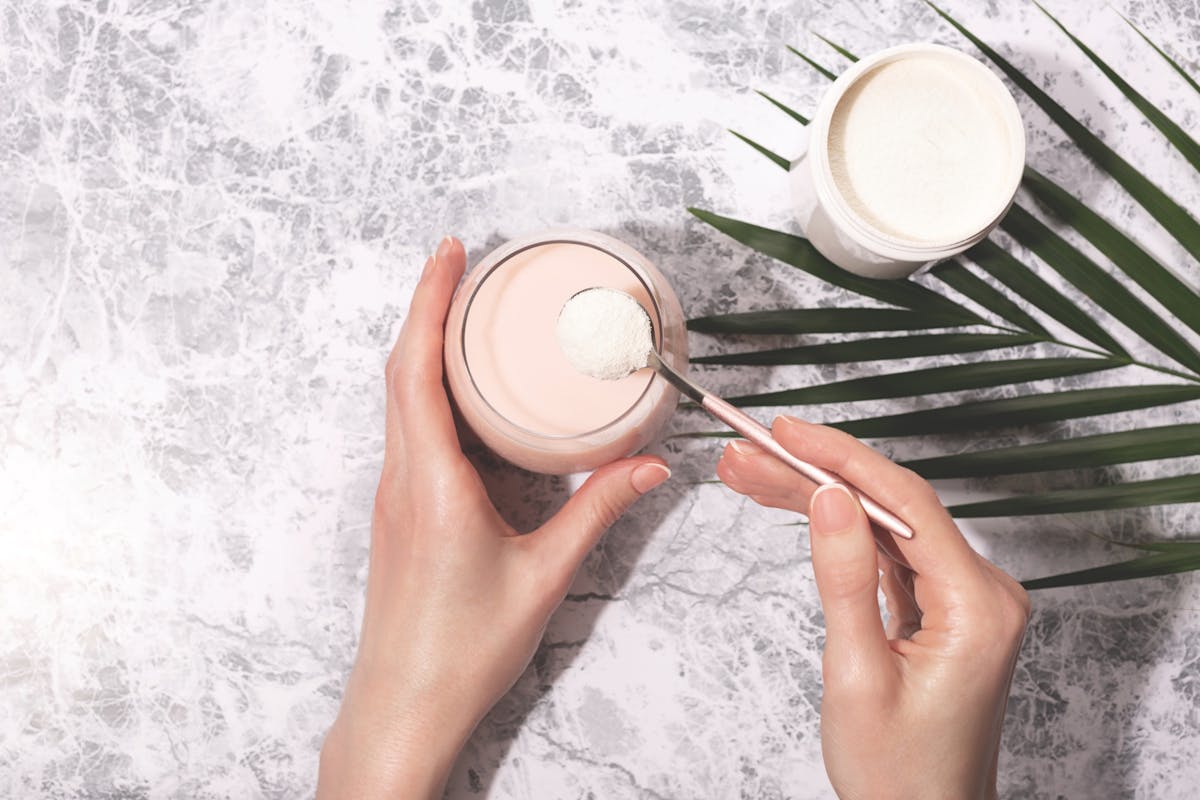Creatine is one of the top muscle-building supplements on the market today. Its widespread use by many, particularly athletes, and decades of research make it an attractive option. But, is there such a thing as creatine hair loss or is creatine bad for you in any other ways?
Everything You Need To Know About Creatine & Hair Loss
Hair Health
9 Min Read

Get hair, health, and science news delivered right to your inbox.

Medically Reviewed by
DR. MELISSA ANZELONE, N NDBelow, read about what studies on the supplement are saying, as well as find a few answers to general creatine-related questions, like what is the recommended dosage of creatine? Does creatine cause hair loss? And, does creatine expire?
How to take creatine
When taken as a supplement, the most researched and utilized form of the product is creatine monohydrate. It’s also available in other forms as well, some of which include: creatine hydrochloride, creatine ethyl ester, buffered creatine, and creatine gluconate. Most users take the supplement with the goal of bulking up, so be sure to use it with high-intensity exercises like weight lifting and other muscle group-focused workouts that will get your heart rate up. Creatine can also be found in fish and other meats.
How creatine helps the body build muscle
Creatine is a natural compound found mostly in your body’s skeletal muscle, but research shows that taking creatine monohydrate before high-intensity exercise increases your body’s creatine stores. The normal amount of creatine found in the muscles averages around 120 to 160 mmol/kg. (in a 70-kilogram or approximately 154-pound individual), according to a review on creatine supplementation. This unlocks more energy in your muscles and allows for longer and more effective exercise. The lead source of energy in your body is adenosine triphosphate (ATP). When your store of ATP is used up while training, taking creatine uses the replenished stores of phosphocreatine to replenish ATP, lengthening your workout and providing other benefits.
Rumors about creatine’s side effects
So, does creatine cause hair loss? We’ll get right to it: No scientific study has ever conclusively found that creatine does cause hair loss. A 2009 study on only 20 rugby players had the athletes take 25g/day of creatine powder for 1 week, then 5g/day for 2 weeks and compared their results with those of the group who only took a placebo. Some tested had higher levels of DHT, a testosterone-related metabolite. A spike in DHT causes hair loss for some men, but those in this group didn’t specifically report it.
There hasn’t been a specific study found on creatine’s possible link to DHT increases since, but researchers are pretty clear about creatine being a fairly safe product to take. One review on creatine notes that the only side effect consistently reported from supplementing with creatine is weight gain. Although taking creatine supplements may have adverse effects on some users, some of these claims you’ve likely seen fall under an umbrella of “anecdotal evidence,” meaning that the results are not backed by scientific research. Someone might write in a fitness message board that creatine caused balding after a few months of use, but so far research hasn’t backed that up.
As we’ve pointed out in other posts, hair loss is typically a combination of factors and even genetics are not always the common denominator among those affected. This is the same with creatine hair loss. A seasoned triathlete might complain that taking creatine monohydrate powder caused hair thinning and then it started to grow back after he switched to a different supplement. While that may have been his experience, it isn’t necessarily attributed as creatine side effects.
Does creatine expire?
Like many supplements, creatine lasts for a certain length of time. Most versions of it can last for around one year. But make sure to check labels, as all products have different expiration dates and creatine does expire. If you make sure it is stored in a dry and cool area, you should be able to safely use the product as part of your workout. Though it may be alarming to some, if you are using a creatine monohydrate powder and you see clumping, it does not inevitably mean it’s gone “bad,” since likely result of exposure to moisture. If it is smelly or discolored (which shouldn’t happen unless it’s been out at room temperature for a few days), then we recommend replacing it with some new creatine monohydrate powder. Fortunately, because of its well-established role in the fitness world, creatine is fairly inexpensive.
A few final thoughts
Is creatine bad for you? Does creatine cause hair loss? As with any supplement, it’s important to be aware of potential side effects. But according to research, creatine shouldn’t have too many negative side effects. Your hair shouldn’t suffer when you take it. If hair loss is a concern for you, consider adding a hair wellness supplement like Nutrafol to your regimen.
Together with high-intensity exercise, creatine monohydrate will increase your body’s creatine stores and create more of your body’s ATP to build muscle and help you exercise longer.